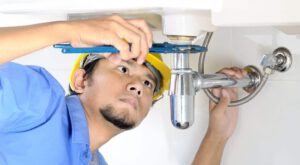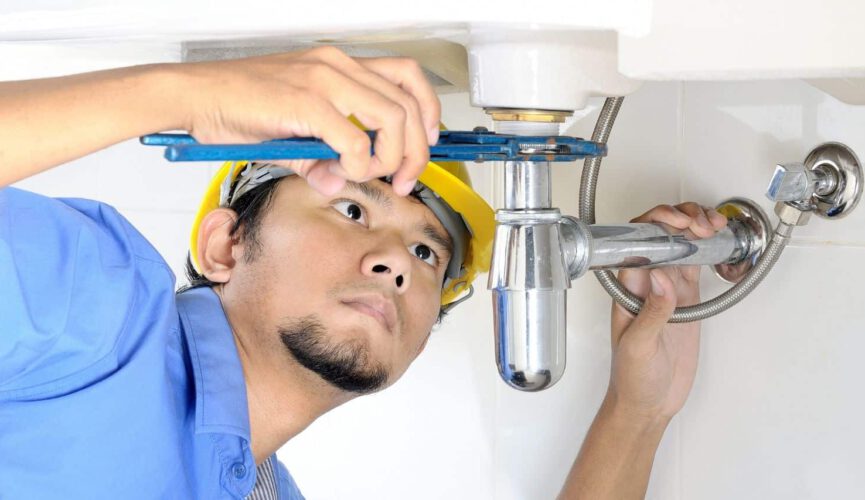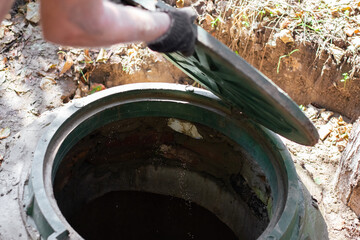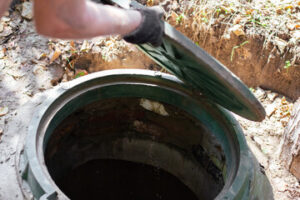Plumber install and repair pipes that carry water, waste, and gases. They also fix toilets and faucets and are in high demand during emergencies. Plumbers must have critical thinking skills to troubleshoot problems. They need to be able to read blueprints and work with tools.

They must also be able to bend, crouch, and squeeze into small spaces. They need upper-body strength to run the equipment. They also need to be able to communicate verbally with customers and coworkers.
Plumbers are trained in a variety of ways, including on-the-job training and vocational school programs. They are also required to be licensed in the state where they work. In some cases, apprentices must have a master plumber as a mentor. Regardless of their training, it’s important for plumbers to keep up with changing technologies and procedures.
Besides repairing leaks and clogged drains, plumbers can do other tasks, such as installing new appliances and plumbing fixtures. They are often called upon to advise customers on water conservation and best practices when it comes to repairing, replacing, or maintaining plumbing systems. They can also assist in the design of new plumbing systems for homes or commercial buildings.
They are also trained in the installation of kitchen and bathroom faucets, toilets, showers, and other items. They are the first trade workers that homeowners or building managers turn to when they have a plumbing emergency. Some of the most common emergencies include blocked drains and faulty toilets. Although these problems are serious, they are minor repairs compared to other more complex issues that may occur, such as a burst pipe.
There are several routes to becoming a plumber, including formal college courses and apprenticeships. Most of these routes take between two and four years to complete. Apprenticeships are available through trade schools, unions, and other organizations.
Plumbers must have excellent critical thinking skills to be successful in their field. They must be able to weigh different solutions and make decisions quickly. They also must be able to communicate effectively with their clients, especially when explaining technical matters. This job can be physically demanding, requiring heavy lifting and working in tight spaces. It can also be dangerous, especially if safety precautions are not taken.
Plumbers must be able to read and write, and be familiar with blueprints and construction plans. They also must be able to do math and geometry to understand how plumbing systems work. In addition, they must be able to work well in stressful situations and meet deadlines. Many plumbers choose to work as independent contractors, which gives them more flexibility and control over their work schedules.
They are licensed
The plumbing industry is one of the most regulated trades in the United States. Plumbers must pass a series of exams and obtain a license before they can work in the field. There are several different routes to becoming a plumber, including attending a vocational school or completing an apprenticeship. The apprenticeship usually lasts about five years and includes classroom instruction and on-the-job training. Many apprentices are also members of a union, which helps them gain employment opportunities and earn higher wages.
Plumbers are responsible for installing, repairing and maintaining the pipes and fixtures that facilitate water supply, waste water disposal and heating in residential and commercial buildings. Their duties include inspecting and testing existing pipework to determine if the system is working properly. They also have to read blueprints and drawings to understand the layout of plumbing systems and to make necessary repairs. In addition to their technical knowledge, plumbers must have the ability to communicate effectively with customers and other contractors.
Plumbing skills include the ability to use a wide variety of tools and materials. They are also required to have good analytical problem-solving abilities. They need to be able to weigh options when deciding on the best solution for a customer. They must also be able to complete repairs within a specified timeframe. Plumbers must also be able to work in tight spaces and deal with hazardous materials.
Licensed plumbers must also keep up with new technologies and practices in the industry. They are required to attend continuing education classes, which help them stay up-to-date on changes in the industry. They must also adhere to a code of ethics. This ensures that they are providing quality service and minimizing the risk of contamination of drinking water or other environmental hazards.
It is important to hire a reputable and licensed plumber. If you choose to use an unlicensed plumber, you could be putting your home and family at risk. A reputable plumber will be insured and have the experience to handle all types of plumbing projects, from minor repairs to major installations. An unlicensed plumber will not have the proper training and will probably not follow the necessary safety measures. This can lead to costly mistakes that could result in water damage and health hazards.
They are insured
Plumbing professionals are not only licensed, but also insured. This insurance ensures that you’re protected against any potential damage to your property. It also protects you in case of an injury or accident on the job. Depending on your business size and types of work, you may need different kinds of plumbers’ insurance. For example, self-employed plumbers should consider getting business income insurance, which pays a fraction of their salary to help them maintain their standard of living in the event that they become ill or injured while working on a project.
Whether it’s a broken toilet, clogged drain or water system issue, plumbing problems can be costly. Luckily, a good plumber will have all the tools and knowledge to fix them quickly and efficiently. A reputable plumber will also have emergency services that provide round-the-clock assistance and repairs, even during the middle of the night.
In the midst of a fast-growing economy, New York’s vast array of residential and commercial buildings require efficient water and waste disposal systems. Plumbers are responsible for ensuring that these systems function properly, providing access to clean water and effective drainage in high-density urban areas. In a state with such premium property values, it’s essential for plumbers to carry general liability insurance.
California’s diverse economic landscape includes bustling urban centers and thriving agricultural regions. In addition to traditional industries like agriculture and manufacturing, the state’s modern sectors of logistics, media, and technology contribute to its growing economy. These industries have a direct impact on the state’s infrastructure, and plumbers play an important role in ensuring its health.
Because plumbers often travel between jobs, they need to transport their equipment and tools. This can be a risky proposition, especially since many thieves target small businesses. If a plumber’s equipment is stolen, it can be expensive to replace it. General property insurance can help protect these expenses by covering the cost of replacing damaged or stolen equipment.
While some states don’t require plumbers to carry business insurance, it is highly recommended. Some clients may even ask for proof of this coverage before agreeing to work with them. Having proof of insurance will not only reassure customers, but it can also increase your professional credibility.
They are available
While plumbing is a male-dominated field, women are becoming more involved in the industry. As a result, they have many advantages to offer businesses. These include lower costs, better customer service and improved job performance. Women are also more likely to stay in their careers and are able to find better work-life balance than men. For these reasons, it is important for employers to consider hiring more women plumbers. A few simple changes to the job posting and interview process can make a huge difference.
Another advantage of being a plumber is that it can be a lucrative career choice. Plumbers make a good living and can often advance their careers to become master plumbers or even run their own plumbing company. In addition, they can work on a variety of projects and industries. Moreover, plumbers have a very flexible schedule. They can work more in times of high demand and less when they are not busy. This flexibility can help them enjoy a healthy lifestyle.
Being a plumber is a physical job and can be stressful at times. However, it can also be rewarding and satisfying. Plumbers get to meet people from all walks of life and can feel like they are making a difference in their communities. In addition, they can spend a lot of time with their families.
Plumbers are also in a unique position because they are needed in all economic conditions. Even if the economy is down, there will always be someone with a leaky toilet. The plumbing industry is also highly regulated, so you can feel secure in your career.
If you are interested in becoming a plumber, it is important to get an education. You can do this at a vocational school or community college for much less money than a traditional college degree. Alternatively, you can also enroll in an apprenticeship program that will pay you while you learn, allowing you to graduate debt-free.
In addition to your regular salary, plumbers can earn extra income from social media channels and blogs. They can also make money from writing books and teaching classes on how to do simple plumbing tasks. This extra income can be beneficial for a family or for paying off debts.





